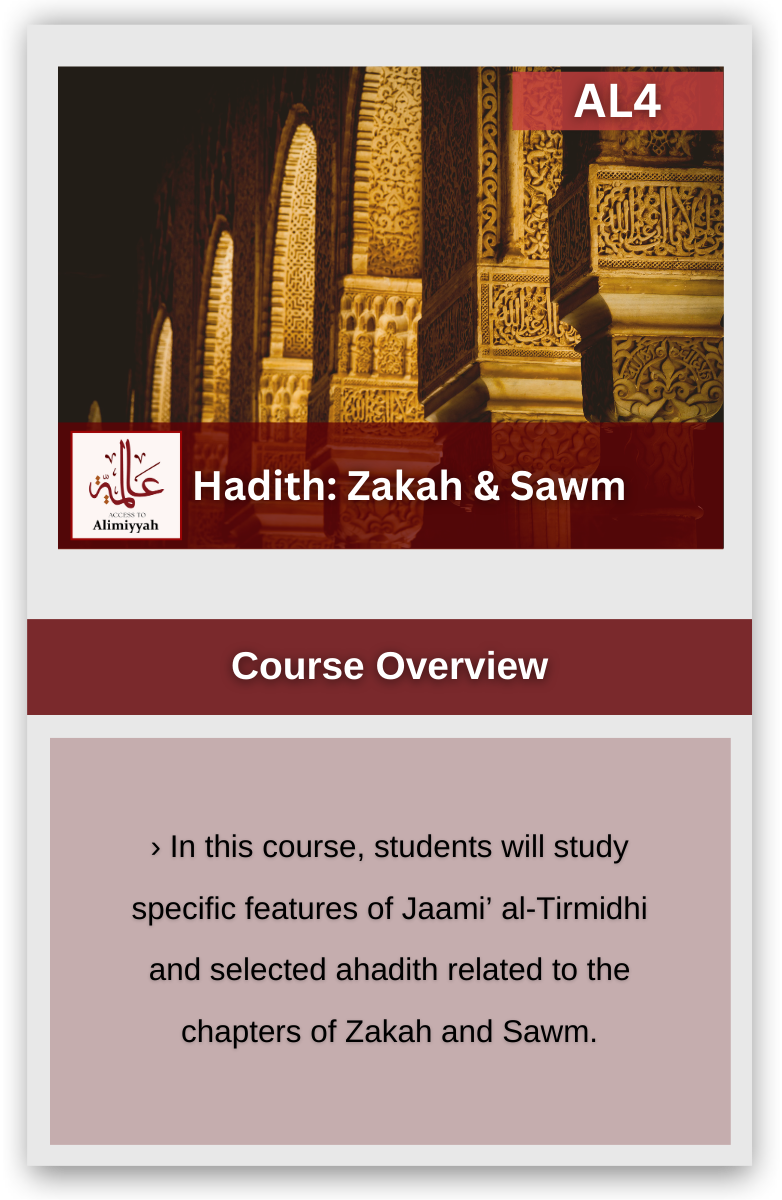Description
Course Description:
In this course, students will study specific features of Jaami’ al-Tirmidhi and selected ahadith related to the chapters of Zakah and Sawm.
Level: Alimiyyah Programme Year 4
Context:
This course is part of a collection of courses taught thematically with the aim of covering all of the topics and themes of hadith in the six major compilations.
Learning Outcomes:
Knowledge and Understanding: students will demonstrate systematic conceptual understanding of the chapters of Zakah and Sawm in Jaami’ al-Tirmidhi with particular reference to:
- Context of individual and groups of narrations (asbab al-wurud).
- The interplay between text and context, law and society, and an attentiveness to their real-world expression.
- The application of hadith in today’s context, current problems and new insights into their application.
- The spectrum of classical and contemporary scholarly opinion on the interpretation of hadith.
- Gharibul hadith.
- Critical commentary related to the isnad of hadith.
- Awareness of the latest and current research and advanced scholarship in the above.
- Awareness of hadith that are fabricated or extremely weak.
- Memorise a selection of hadith from the above themes.
Skills:
- Demonstrate the capacity to engage closely with and evaluate the unique features of each hadith.
- Demonstrate originality in the interpretation of hadith and its practical application to new and emerging situations using established techniques.
- Deal with complex issues both systematically and creatively, make sound judgements in the absence of scriptural data, and communicate conclusions clearly to specialist and non-specialist audiences.
- Demonstrate self-direction and originality in tackling and solving problems, and act autonomously in planning and implementing tasks at a professional or equivalent level.
- Recall from memory selected hadiths from each chapter (baab) with an emphasis on the narrations with the broadest wording.
- Work in a self-disciplined and self-directed manner, showing both independence of mind and initiative.
- Have respect for others’ views even when disagreeing with them and demonstrate intellectual empathy.
- Demonstrate the ability to synthesise knowledge of the major islamic sciences of hadith, tafsir, and fiqh when dealing with a problem (mas’alah).
- Recall from memory selected hadiths from each chapter (bab) with an emphasis on the narrations with the broadest wording.
Prerequisites:
Completion of the Alimiyyah programme (Year 3) at EC, or equivalent studies such as studies up to Mawquf ‘Alaih or Mishkat in Darul Ulooms, or an undergraduate programme in shari’ah from an Islamic University. Students who have not studied a dedicated programme at an institute such as the above may also be considered if they have studied privately and can demonstrate that they meet the following specific prerequisites:
- Demonstrate familiarity with Uloom al-Qur’an and and themes and meanings of the Qur’an.
- Comprehensive study of fiqh according to at least one juristic school and a general understanding of the opinions of others.
- Study of the broad themes of hadith such Iman, Ibadat, Mu’amalaat, Mu’asharaat, etc.
- Study of at least one established text in Usul al-Fiqh, Uloom al-Hadith, Uloom al-Qur’an, and classical Muslim theology (Aqeedah).
- Students would have to prove that they have studied the above with teachers rather than self studied them.
- Familiarity with the Seerah and Islamic history even if through self study.
- Proficiency in Arabic to be able to attend lectures delivered in Arabic and study the texts of the major hadith collections. If you are unsure about meeting the prerequisites, please enquire directly.
Teaching and Learning Strategies:
Interactive lectures, written notes, white board, workshops, and assignments set to students.
Course Delivery:
This course will be delivered on campus and streamed live online using an online live streaming platform called ‘Zoom’. Lessons will be recorded and students provided access to them. Further details will be emailed to students 5 days before the course commences insha Allah.
For more information on how this works, please click here.
Course Teacher: Shaykh Ashraf Zaman


